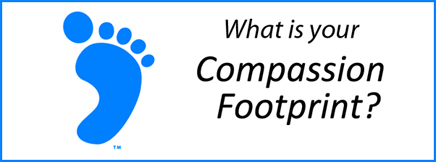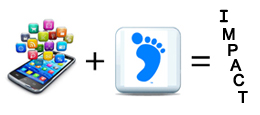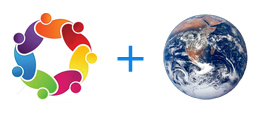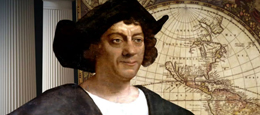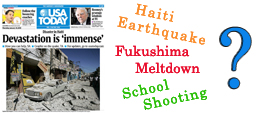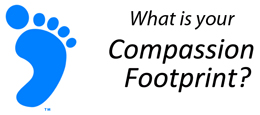"We will never have Homeland Security until we realize
that the whole world is our homeland."
~ Eric Kasum, founder of the Imagine Institute
Your Compassion Footprint
What is your Compassion Footprint? Your Compassion Footprint is like a Carbon Footprint, only more positive. Kindness is magic. So your Compassion Footprint is the impact, the ripple effect your kindness, empathy, and non-violence have upon everybody around you, and thus, the world.
Mahatma Gandhi was once asked: What is your message? He replied: "My life is my message."
Elie Wiesel, the Nobel Peace Prize winner, said, "We become the stories we hear, and the stories we tell." Stories are not just informative. They are transformative. That's why stories are so important. We LIVE into them. They become our destiny.
Your life becomes a story. Thus, it has meaning.
For some reason, stories don't just impact us, they actually change who we are. You can't become something until you can imagine it. If you can't see it, you can't be it.
At the Imagine Institute, we're taking every opportunity to encourage people to think compassionately about issues that really matter. Not just think, but act compassionately too.
What You Can Do
How can you increase your Compassion Footprint? Three ways:
1) Kindness - Kindness is a universal language. Kindness has no borders.
2) Empathy - Empathy is listening with a big heart, feeling another's heartbreak as your own. Empathy is knowing that if a child is injured and bleeds in Thailand, you bleed too. If child is hungry in Africa, you are hungry too. All children are OUR CHILDREN.
3) Acts of Service - Harmony is created by sincere acts of service to others. Service to others is one of the purest forms of peace building.
Stories Change the World
Why are stories so powerful? I'm not sure. Perhaps it is because for millions of years we sat around campfires at night. And what did we do? We told stories! Why do you think books, TV shows, movies, and theater productions are so popular today? Because we are story animals.
The simple fact is, these stories can change the world. Your acts of compassion become your story.
Nan's Cows
Let me tell you a story. It changed my life. It's the reason I started the Imagine Institute, and hosted the Imagine Peace Conference at UC Berkeley in 2011. I call it the story of Nan's Cows. I was working for the Shinnyo-en Foundation, a Buddhist foundation in San Francisco devoted to creating world peace. There, I met a wonderful lady named Nan Peterson, director of Service Learning at the Blake School, a K-12 school in Minneapolis, Minnesota. Nan traveled to Nairobi, Kenya with a group of friends from her school and her church. They thought maybe they would find a way to provide clean water for people in villages. She had a wonderful perspective. "We didn't go there to save the people," she told me. "We went there to save ourselves." According to Unicef, there are 20 million children in Kenya; 2.5 million are orphans! Can you imagine that?
Nan went to Kibera, the slum outside Nairobi. Before long, she got a surprise. A little boy walked up to her and handed her a baby wrapped up in a blanket. As he put the baby into her arms, the boy said: "My father died. My mother died. And I'm not feeling so good myself. Here, please take care of my sister. If I die, they will throw her into the street to die."
The girls are not valued in that society. And there are so many orphans that the baby girls are thrown into the streets to die.
Nan searched for an orphanage for girls, but it was extremely difficult to find one. Finally, she found an orphanage and the girls were starving to death. They had one old, half-dead cow that only gave one cup of milk a day. So each girl only got ONE TEASPOON of milk a day!
Heartbroken
Nan was heartbroken. She went home to her school in Minnesota and asked the kids... what can we do? The kids got the idea to make homemade paper and sell it to buy a cow. So they made paper and sold it. And when they were done, they had enough money to buy... FOUR COWS! And enough FOOD to feed all of the cows for ONE FULL YEAR!
Some of the kids at Nan's school were as young as 6 years old. Saving the lives of children halfway around the planet who they never even met. When I heard this story I felt embarrassed and, honestly, a little ashamed of myself. I thought: If a 6-year-old could do that... what could I do?
The story of Nan's Cows taught me one of the most important lessons of my life: One person - even a six-year-old child - can save somebody's life. You can make a difference.
That's where the idea of the Imagine Institute was born... because those kids imagined what was possible. And someone told me a story that changed my life.
Stories create transformative experiences, and that's what leads to change.
A Mosque for Muslims
Here's another story that inspired me. While I was working at the Shinnyo-en foundation, there was a terrible earthquake in Pakistan. Thousands of people were killed, hundreds of thousands lost everything. Their homes and mosques crumbled to dust. The head of the Shinnyo-en Buddhist order, Her Holiness Shinso Keishu, asked local leaders in Pakistan if she could help. She expected they might need medical supplies, food and water. But the elders in the villages asked her to build a mosque.
A mosque for Muslims? Built by a Buddhist organization? Her Holiness wasn't sure... would this offend anyone? Wouldn't they rather have medical aid? But soon came her answer: Everyone had lost people they loved and they had no place of spiritual refuge. So she said "Yes. Let's build them a mosque." And the mosque was built and it stands today.
What would happen if religions, instead of fighting and violence and insisting that everybody agree with them, instead used their faith as a bridge to build peace? What if Christians built synagogues for Jews, and Jews built mosques for Muslims, and Catholics built temples for Buddhists? What kind of a world would we have? It's an extraordinary idea, isn't it?
He Stumbled Onto A Battlefield
Let me tell you the story about Henry Dunant. He was a Swiss businessman traveling through Europe in 1859 when he stumbled upon a battlefield at the Battle of Solferino. There, 23,000 men lay wounded, dying or dead on the battlefield receiving little or no care. Dunant was so stunned and horrified that he stayed at the battlefield, trying to help the wounded and reduce their suffering. He set up make-shift hospitals and asked the local people to help the wounded without regard to their side in the conflict with the slogan "Tutti fratelli" (All are brothers). He also succeeded in gaining the release of Austrian doctors captured by the French.
Once he returned home to Geneva, Dunant wrote a book called A Memory of Solferino which he printed at his own expense. He brought his book to many leading political and military figures in Europe. He put forth the idea that in the future a neutral organization should exist to provide care to wounded soldiers. A few years later he helped to found the International Red Cross and also the very first Geneva Convention.
In 1901, he was awarded the first Nobel Peace Prize ever given. He was not a doctor. He knew nothing at all about conflict resolution or public service organizations or fundraising. He was just a man with a broken heart who decided to take action to benefit mankind.
The Ripple Effect
One last story. Did you know that Mahatma Gandhi was a vegetarian? Do you know why? Well, in 1883 Henry Salt, a British professor, read a book called The Ethics of Diet by Howard Williams. This gave him the idea to become a vegetarian. Salt wrote a book that inspired Mahatma Gandhi to become a vegetarian. Salt also introduced Gandhi to the writings of Henry David Thoreau (Walden Pond, On Civil Disobedience) which inspired Gandhi to use nonviolent acts of civil disobedience in India. When Gandhi visited London, one of the first people he asked to meet was Henry Salt. Gandhi, in turn, inspired millions of other people with his ideas, like Dr. Martin Luther King, Jr., who led the struggle for Civil Rights.
How can you increase your Compassion Footprint?
Ideas are contagious. Stories change lives. What's your story?

